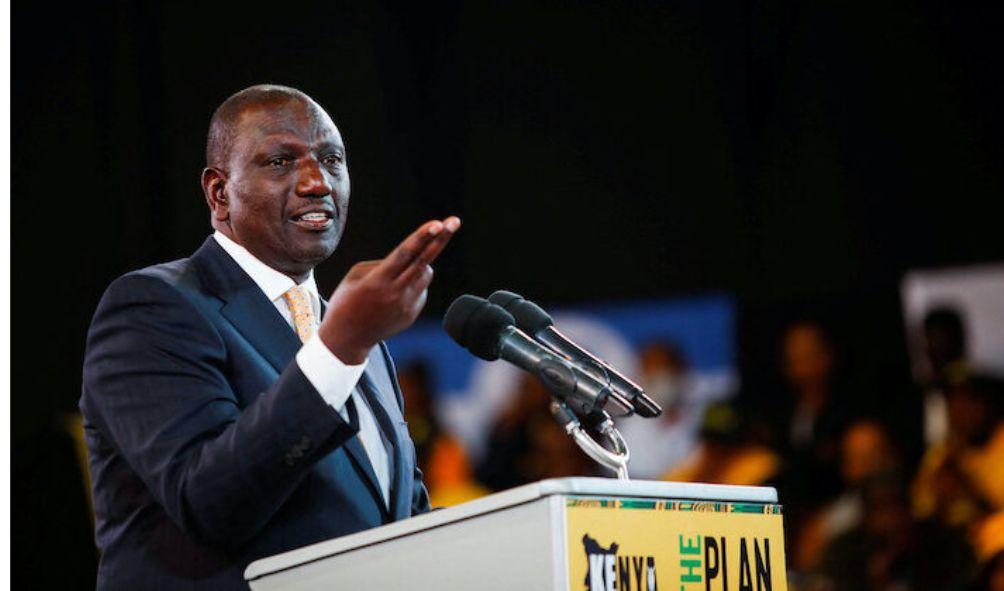President Ruto’s Administration Plans to Secure Sh718 Billion in New Fiscal Year through Borrowing
The government of President William Ruto will borrow at least Sh718 billion in the fiscal year beginning in July, despite a heavy debt service burden.
Treasury Cabinet Secretary Njuguna Ndung’u stated yesterday that the government plans to raise Sh2.96 trillion in total revenues and spend Sh3.7 trillion during the 2023/24 fiscal year, leaving a Sh718 billion budget deficit that will be filled through domestic and international borrowing.
“Given projected revenue and grants against projected expenditures, the fiscal deficit is projected to decline to Sh718 billion (4.4% of GDP) in 2022/23, from Sh840.9 billion (5.8% of GDP) in 2022/23.
Prof. Ndung’u stated this when delivering the inaugural budget of the Kenya Kwanza government.
The CS stated that the government was relying on the assistance of multinational organizations such as the World Bank and International Monetary Fund (IMF) to achieve fiscal consolidation and reduce the fiscal deficit from 5.8% in the current fiscal year to 4.4% in 2023/24 and 3.6% in 2026/27.
As a means of reducing its reliance on borrowing, the government intends to pursue more taxes from Kenyans through an aggressive revenue mobilization strategy.
While insisting that Kenya’s public debt is still manageable, the CS noted that there are “increased risks of debt distress due to persistent global shocks that negatively impact the liquidity ratios.”
ALSO READ: Exclusive: Ruto, Gachagua, and Mudavadi Secure Unprecedented Sh3.4 Billion Boost in New Budget for Office Enhancements
Treasury recognizes that the depreciation of the Kenyan Shilling against major foreign currencies has increased not only the cost of external debt service but also the external public debt stock.
“External debt service is projected to rise to Sh475.6 billion in 2023/24, up from Sh242.1 billion in 2022/23, primarily due to redemption of the $2 billion Eurobond. In preparation for the redemption of this maturing bond, the Treasury issued an expression of interest to recruit a lead manager to advise the government on liability management options leading up to the resolution of the Eurobond 2024,” the CS said.
Public debt
According to the most recent Treasury report, Kenya’s public debt reached Sh9.29 trillion in March, while debt service increased by Sh179 billion in the nine months before March, as reported by the Controller of Budget (COB).
Domestic debt was Sh4.539 trillion (31.3% of GDP), while external debt was Sh4.85 trillion (33.4% of GDP). Domestic and external debt stocks accounted for 48.3% and 51.7%, respectively, of total debt stocks, according to the Treasury’s March 2023 public debt bulletin.
In contrast, the COB noted that between July 2022 and March of this year, “total expenditures on public debt amounted to Sh831.03 billion, compared to Sh651.73 billion during the same period in FY 2021/22.”
The government spent Sh393 billion on principal debt repayment and Sh436.6 billion on interest payments, primarily for domestic loans.
ALSO READ: Energy CS Woos Global Allies to Deliver on Ruto’s Game-Changing Gas Commitment
“Public debt expenditure consisted of Sh302.56 billion in external debt and Sh528.47 billion in domestic debt. The servicing of external debt included Sh186.84 billion in principal payments, Sh114.50 billion in interest payments, Sh1.07 billion in commission fees, and Sh156.09 million in other fees.
“Principal and interest payments totaled Sh206.33 billion and Sh322.14 billion, respectively,” the COB reported in its report on the national government’s budget implementation review report for the period spanning July 2022 to March.
Prof. Ndung’u also indicated that the government’s pending bills have continued to increase, noting that the Treasury has drafted a cabinet memorandum requesting the cabinet’s approval of the formation of a pending bills verification committee to analyze the stock of all pending bills and provide guidance on how they will be settled.
At the end of March 2023, the national government’s outstanding bills totaled Sh537.2 billion, while county governments’ totaled Sh159.7 billion.
“Management of pending Bills is difficult. In the eyes of the public, it will serve as a significant benchmark against which the government’s financial management style will be tested and evaluated. “The delay in settling overdue bills has led to the deterioration of the financial positions of businesses, particularly MSMEs, including those owned by women, youth, and persons with disabilities,” stated the CS.
In the national government’s budget implementation review report for the nine months ending in March, the Controller of Budget (COB) warned that pending bills continue to hurt business activity.
ALSO READ: Diplomatic Spat: Foreign Affairs PS Claps Back as Sudan Shuns Ruto’s Leadership in Peace Talks
“Pending bills impact business liquidity and deprive the government of tax revenue. By Treasury Circular No. 04/2022, the Controller of Budget recommends that National and County governments prioritize payment of pending bills by settling them as a first charge in the budget for the current fiscal year,” the COB stated.
President Ruto’s Administration Plans to Secure Sh718 Billion in New Fiscal Year through Borrowing
HEY READER. PLEASE SUPPORT THIS SITE BY CLICKING ADS. DON’T FORGET TO HIT THE NOTIFICATION BELL FOR MORE UPDATES AROUND THE GLOBE.
